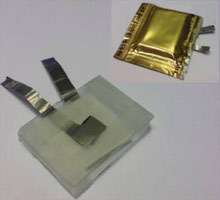September 15, 2009 weblog
Salt and Paper Battery May One Day Replace Lithium Batteries

Credit: Maria Stromme, Uppsala University
(PhysOrg.com) -- Salt and paper battery can be used in many low-power devices, such as medical implants, RFID tags, wireless sensors and smart cards. This battery uses a thin-film which makes it an attractive feature for many portable devices that draws a low current.
At Uppsala University in Sweden, researchers have developed a flexible battery made of two inexpensive materials: cellulose and salt.
The cellulose is derived from a polluting algae found in seas and lakes. The algae's walls contain cellulose that has a different nanostructure, which gives it 100 times the surface area.
The battery is made by coating the paper, made from this cellulose, with a conducting polymer and inserting a salt-solution-soaked filter paper between the paper electrodes.
Chlorine ions travel from the batteries positive terminal to the negative terminal while current is produced in the external circuit by the flow of electrons.
The battery can be recharged in tens of seconds because the ions flow through the thin electrode quickly. In comparison to a lithium battery that would take 20 minutes to recharge.
The salt and paper battery is still in the early stages of development as compared to other thin-film technologies. For a battery to be cost effective you need to able to obtain the material at relatively low cost and have a good manufacture process in place.
The battery could be produced commercially in about three years and made available to distributors.
Via: RSC and Technology Review
© 2009 PhysOrg.com


















